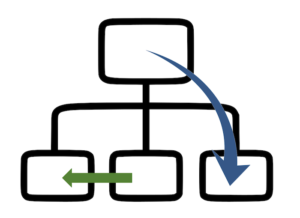Longevity for product executives is pretty short: typically between 2 and 2.5 years. So in the course of a career, there are lots of occasions when CPOs / VPs of Product choose to leave their companies. Doing this well – gracefully – is important for everyone involved.
I have 8-10 product leaders in my coaching roster at any one time, so I talk people through departures 8-10x more often than someone inside a single company. We work on exiting a company purposefully: how to plan a transition; support and encourage the product team; thank coworkers; and leave a good impression on our way out the door. This is more than just good manners since tech is a small community and we’ll be working with these same people again. And we care deeply about the careers of the people who report to us.
Let’s assume that you’re a C-level leader, this is a voluntary departure, you want the company to succeed after you’ve gone,* and you’ll be taking a little time off before looking for your next adventure. This unfolds in four steps…
[1] Planning Your Resignation
- Be clear with yourself about your reasons for leaving (bored; need new challenges; better comp elsewhere or business prospects elsewhere; following your spouse to a new geography; wanting a smaller or bigger organization…) You probably won’t share this, but remember your reasons when others try to talk you out of leaving.**

- Script out an exit story for yourself and the CEO that reflects well on everyone. Write it down. This will serve both for internal communications and later conversations with hiring companies. Make it positive for you and the company: as a soon-to-be-former exec and shareholder, you want the company to thrive after you’ve gone. The best exit stories are factual but unemotional, don’t criticize the company or blame individuals, and don’t unnecessarily lower morale or trigger mass departures.
- Plan a short transition period (2 weeks). After I’ve given notice, the remaining workdays got longer and longer. I didn’t want to make decisions that my replacement would need to undo. And coworkers immediately looked for someone who would be there to drive decisions after I had gone. Things usually got very quiet by Day 3, so two weeks felt more like six weeks.
[2] Tendering Your Resignation
- As CPO, you probably report to the CEO or COO. You owe them a face-to-face meeting (or one-on-one Zoom) to deliver the news. Executive resignations via text or email are bad form. Remember that future hiring committees will do reference checks with your CEO, so manners matter.
- Expect some counter-offers, but don’t get talked out of leaving. (If you’re unsure, threatening the CEO with a resignation is a mistake.**) This should not be a surprise, but don’t raise any company issues or personal grievances that you haven’t already brought up. Focus on how you can be most helpful to the company during this transition.
- Talk your CEO through your exit story and agree on it. Send/email your proposed language. Offer to continue saying nice things about the company. Ask for verbal agreement that your CEO will work off that script for eventual reference checks.
- Move quickly to communication details. You already have draft announcement language, recommended backfill, proposed last day, etc. But the CEO (and HR) get to make final decisions. Expect HR to drive internal communications.
- Bring a punch list of transition items. What can you close, finish or thoughtfully hand off? Transition memos, identifying who should chair your regular meetings, drafting upcoming annual reviews, cleaning up work-in-progress, delivering committed public talks or finding a replacement… If practical, be available for critical meetings/questions for a few weeks post-departure. Commit a little time to onboard your eventual replacement. Be a mensch.
[3] Communicating Internally
- HR or the CEO will share the news with the rest of the executive team. Then they will schedule an all-company email or slack… ideally based on the draft that you prepared. This is usually somewhat formal and fits within company procedures/legal guidelines.
- But you don’t want your direct reports to hear about this from an HR email. You’ve built respect and trusted relationships: they should hear this news personally. Ideally, you can pull your directors into a meeting an hour or two before the all-company email goes out. This is a moment to thank them for their brilliance and hard work; to be upbeat about company futures; to answer organizational transition questions. (Stick to your script: don’t spout off about other execs or company failures or personal grudges.)
Most of them will be wondering about how their world changes. Don’t lie, but position this as positively as possible. You want to leave a strong team behind to keep things rolling. Even if you have a new gig lined up, it’s bad form to share that: it invites comparisons, encourages hard questions in a group setting, and hints that you might want members of your team to follow you. - There might be one or two others that you need to tell personally – maybe someone you’ve worked with at several companies. Stress that this is sensitive news, not to be shared until the official version goes out.
- Right away, you’ll need to hand off work and decisions. Identify who’s going to pick up periodic meetings, committee representation, interview rosters, mentoring roles, in-flight strategy development…
- You’re probably the executive sponsor or key contact for important customers, partners and suppliers. Figure out who will pick up that public-facing work and map out a smooth handover. The key message is that commitments are still in place and excellent folks will take over for you: your departure should not reflect badly on the company.
[4] Looking For Your Next Adventure
I’m seeing typical CPO-level job searches taking 6+ months. So it’s important to pace yourself, keep a positive attitude, and take time to process the old gig before starting the new one.
- Be good to yourself. Make time for something fun every day: square dancing or cycling or reading with your 2-year-old or hikes through the woods or baking bread. You’ll be happier – and a better interviewee when it eventually comes around.

- Check in with friends, colleagues, people you've been meaning to re-contact, folks that you have looser connections with. Ask how you can help them, and how they are doing in these uncertain times. Replenish your humanity.
- Keep your hand in. Volunteer with a worthwhile non-profit organization, help a startup, mentor some up-and-comers. Do some discovery around a product idea you’ve been noodling on for 5 years. Keep your brain working. (This also gives you interesting vignettes to share during interviews.)
- Remember that corporate interviewing processes are designed to sell you on open roles, not to offer an unbiased view of their culture and business situation. Likewise, your objective in an interview is to get an offer – even if it’s one you aren’t sure you want – so you’ll need to be enthusiastic and well-prepared for search firms and interviewers.
- Use your LinkedIn network (or my network) to find someone at your target company who will tell you the unvarnished truth (i.e. someone not on the interview roster and not an executive). Ask tough questions like “what would you tell a dear friend or relative who is considering a job at your company?”
- Finally, stick with your exit story. Don’t spend a lot of interview time on it: quickly repeat why you left Company X, what you learned there, any insights or skills that would be especially useful in this next gig. Interviewers really want to hear about how you’ll help solve their current problems – not what you did last time – so focus on the future.
- Once you start the new thing, wait for your ex-reports to reach out to you about new opportunities. (Bad form and potential legal issues if you make the first call.) Then be a mentor and sounding board for them, whether they are interested in your new company or not. Pulling great people up the ladder behind us is one of the great joys of leadership.
Sound Byte
Most of us don’t get much practice resigning from corporate leadership positions, but it’s important to do this gracefully. Plan it the way you’d plan your next product.
___________________________
* You may be leaving a company that’s toxic, or that’s committing financial fraud, or that churns through talent. I am not a lawyer… you may want to consult an employment attorney before taking action if you think something illegal or deeply immoral is going on. Whistleblowers have some legal protections, but the tech industry may penalize you anyway for speaking out. And executive hiring teams frown on candidates who disparage previous employers.
** I strongly discourage people from threatening to leave as a negotiating tactic. When someone tells me they’ve decided to resign, I take them at their word. “What can I do to make this transition out of the company as smooth for you as possible?” Someone who wants more money or authority or a better laptop should ask for that.

